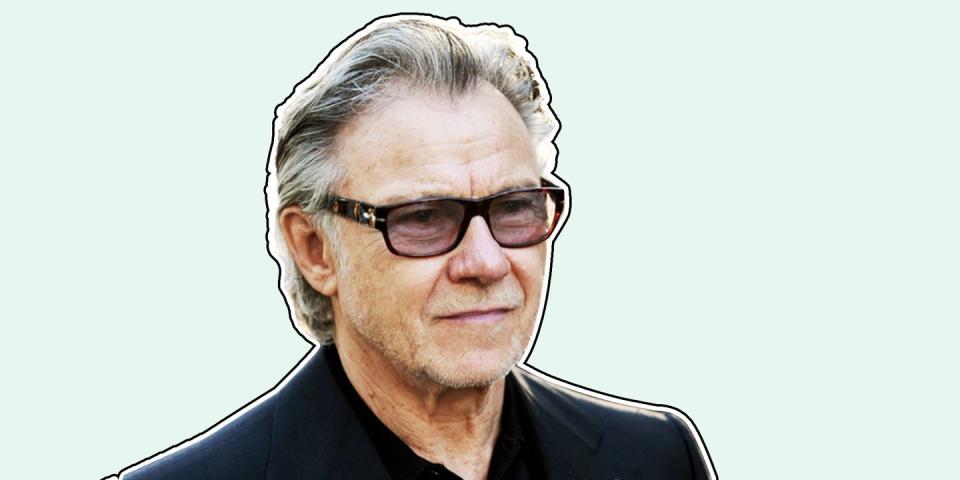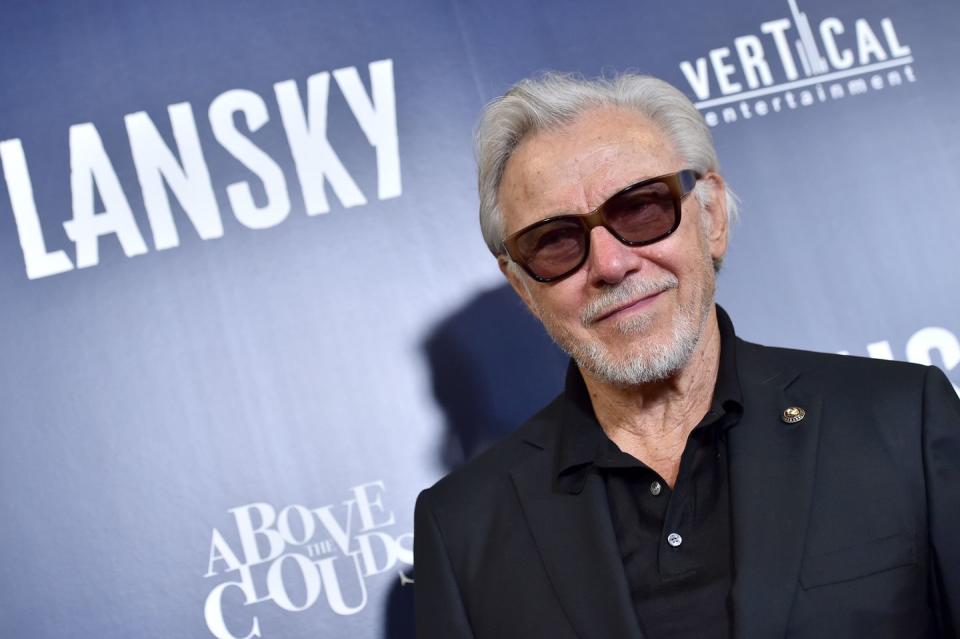Harvey Keitel Would Like a Burger and a Milkshake, Please

Harvey Keitel knows his way around a diner. Definitely better than you do, with your coffee and two Splendas. His parents—Jewish immigrants from Romania and Poland—owned a luncheonette in Brooklyn near where he grew up, so he could most often be found either making a burger or eating one. Malted shakes, too. Egg creams. The occasional charlotte ruse. "I'm full of diner food," Keitel quips over the phone, calling from a Beverly Hills hotel.
So it's no wonder Keitel looks entirely at home in Lansky, where he plays Meyer Lansky, a Mount Rushmore-level figure in the history of organised crime, delivering most of his lines from the other side of a diner booth. The film, which debuted over the summer, goes back and forth between Lansky near the end of his life—telling his story to a journalist—and the mobster as a young man, developing the National Crime Syndicate and gaining power in America's casinos. Keitel, if you had any doubt, imbues the older Lansky with the gravitational pull of, say, Reservoir Dogs's Mr. White, or more recently, The Irishman's Angelo Bruno. We don't exactly see Bad Lieutenant, raging-in-the-car-at-the-Mets levels of rage from Keitel, but you get the sense that his Lansky could get there.
With another infamous crime boss on his resumé, we talked to Keitel about Lansky, why he thinks we need cinema more than ever, his future with Quentin Tarantino, and yes—his elusive diner order.
ESQUIRE: Given that so much of Lansky takes place in a diner, what’s your diner order in real life?
HK: Well, my parents owned a luncheonette in Brooklyn when I was a kid, so I was brought up in a diner. I ate an awful lot of egg creams back in those days. I washed a lot of dishes and made a lot of hamburgers on a grill. I ate a lot of charlotte russes. Do you remember those? I'm full of diner food.
ESQ: Nothing beats a diner smashburger.
HK: What is a smashburger?
ESQ : It's when you ball up the meat in a little baseball, squish it down, and then you cook it that way.
HK: That's the way we made all our hamburgers. And this is Brooklyn in the 1950s.
ESQ: That must have been a good burger.
HK: It was. My mother made it herself. By the way, would you like a milkshake with your smashburger?
ESQ: Absolutely. Strawberry, please.
HK: Oh, my favourite. We never called them milkshakes back in those days. We called it malt. Well, I guess this interview’s over.
ESQ: I'm going to go across the street and get myself a diner burger.
HK: Make it two.

ESQ: There’s one line I want to single out from Lansky. You tell the journalist that the most important measure of ourselves is through the eyes of the people that we love. Outside of the film, do you believe that's the most important measure of a person?
HK: It's a beautiful line. There's a lot of measurements I wish to judge a person. The way they bend over to help somebody who fell down. How they treat someone in need of something.
ESQ: It's how you act when nobody's watching, too.
HK: What? How do you act when nobody's watching?
ESQ: It’s when you're not performing for somebody.
HK: Well, we're always performing for somebody. Can we include ourselves?
ESQ: Maybe?
HK: I don't know about you, but I'll confess—I look in the mirror a lot.
ESQ: Just so I cover my bases here: Was Meyer Lansky someone you've wanted to portray at some point in your career, or did the opportunity come your way and it excited you?
HK: Both things are true. Meyer was a young Jewish lad who came from Poland as an immigrant to America, the way my parents came from Romania and Poland. He went to an impoverished place in New York and he was from a family that wasn't wealthy. I once shot a movie called The Border with Jack Nicholson, and Meyer reminds me the way those people did when we made The Border.
Those immigrants that came when my mother, father did, we were in the similar position. Poverty put you in that position. Not having a job, not having education. You can almost say that you have no hope. Meyer had to be as intelligent as he was to survive. I can only imagine when I think about Meyer—what would he have been like had he had an education? Meyer fascinated me as this young genius of a fellow, because things he did were genius, to organize the way he did. He was a criminal. He was also a father. A father of a child who was bedridden for life, which brings me to the quote of Nancy Reagan—I believe it was back in the ’60s or ’70s—"Just say no to drugs." Just try saying no to a person who hasn't got food on the table or a mother who's abused. Who are the real criminals today? I'll say this line, which I came up myself. Yesterday, for some reason, I was thinking of robots.
ESQ: Really?
HK: There is a sort of a commercial on TV or something, and I thought, "Well, America has the lead in developing robots." It's called the Republican Party.
ESQ: You have to work that into something.
HK: Well, I'm counting on you.
ESQ: To respond to what you said about Meyer Lansky, is on top of that, he served his country, too.
HK: Yes, yes. I was just going to say something about that. But first of all, I don't want to justify crime by all the jobs they created, but they did create thousands of jobs. And he did support Israel when it was at war for their freedom. There were those aspects of Meyer as well. Stuck by his son until the end of his life. He had a hard life in many ways.
It’s funny. Eytan Rockaway wrote and directed Lansky. When I got the call—that this fellow wants me to do the life story of Meyer Lansky—his name was Eyton Rockefeller. I said, "Wow." I saw the cash register jingle. And then when I met him, I found out that I did not get Eytan Rockefeller. I got Eytan Rockaway. So my price went way down. But his father is a well-known professor in Israel who interviewed Meyer. In real life. And the interview in the movie is his word for word interview that he did. I'm not sure he did it with the director's father, but it was the first interview he did in Israel.
ESQ: It's funny you say that. I was in Sleepy Hollow last weekend and I saw Rockefeller’s burial grounds.
HK: That's a prestigious place to be buried. I wouldn't mind that myself.
ESQ: It's beautiful.
HK: When I read the script, I felt Eytan Rockaway's feelings, about him and his father, about Meyer Lansky and that—I don't want to sound like I'm an ad for it—criminality. But criminals aren't just criminals. There's a line in the movie where he talks about the large corporations in America and about Meyer and his people being the underworld. Meyer, "We weren't the underworld. We were the overworld." Big corporations love that part, as being the underworld. We have sort of that problem today, don't we?
ESQ: We do.
HK: This is not an ad for criminality, it's just trying to set the record straight.
ESQ: Quentin Tarantino has been saying that when he finally does make his 10th film, it will be his final one. Could you see yourself taking part in whatever his final film is, if just to bring your relationship with him full circle?
HK: Yes and yes, and yes. I met him for his first film, as you know. It was given to me by a woman, a colleague of mine from The Actors Studio. Well, the rest of the story you know. Quentin came on the scene like a shooting star and he has done so much to inspire young people. I embrace him for that. And so again, yes, and yes, and yes.

ESQ: You grew up watching movies in theatres and loving cinema. After some people said that the pandemic would put movie theatres out of business, what does it mean for you to see people coming back to the cinema?
HK: I just hope it continues. I mean, movies were greatly missed. Movies and the theatre. Live theater was such an important part of the growth of the world, way back when we wore loincloths. I hope I'm not that old. Truly, people gathered to tell stories to each other. Others went out to hunt, others cooked, and to care of the kids. Others came back and told their stories. That's how playwriting began and directing began.
I mean, the people that came from Europe, they came from poverty and death—and their stories really came from the heart, came from the soul. I find that today there's a letting down of the importance of literature in cinema and theatre. We can do our part—to tell these stories that were told years ago, that we as young people are inspired to seek out ourselves. I just read a quote that said, "The most difficult person to get to know is yourself."
ESQ: I believe in that.
HK: His quote was better.
You Might Also Like

